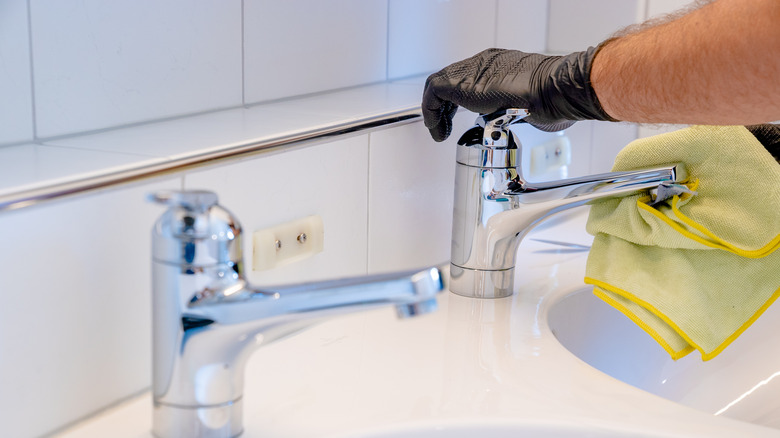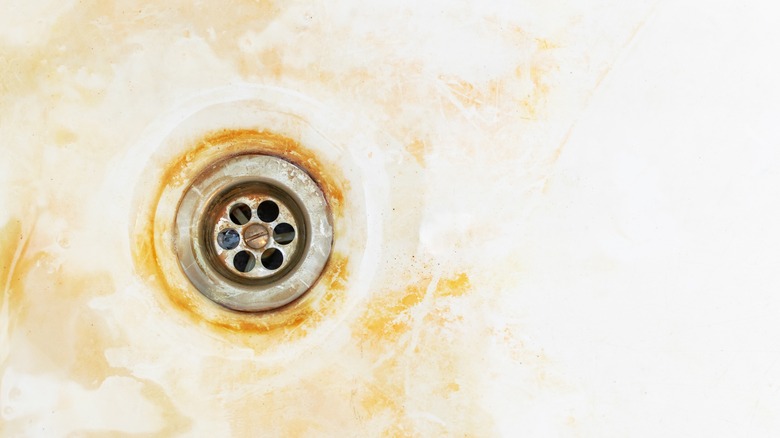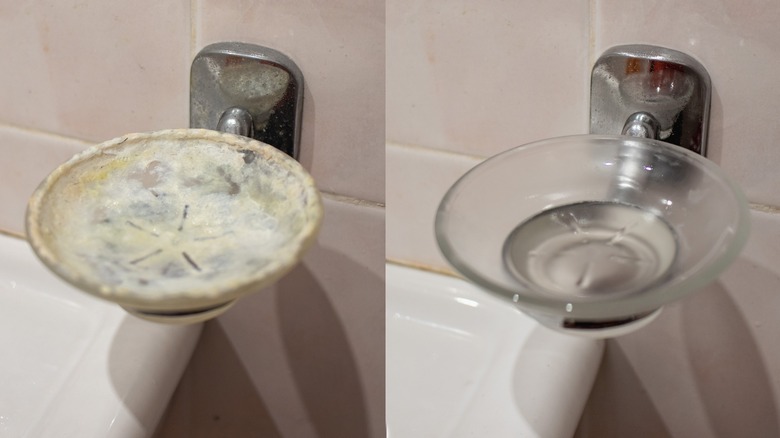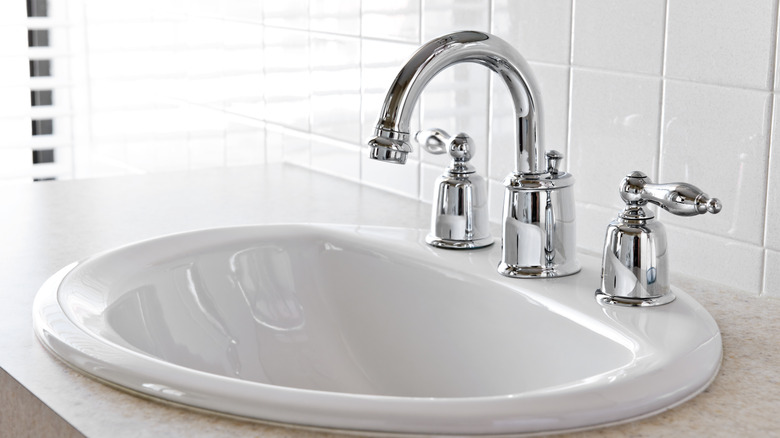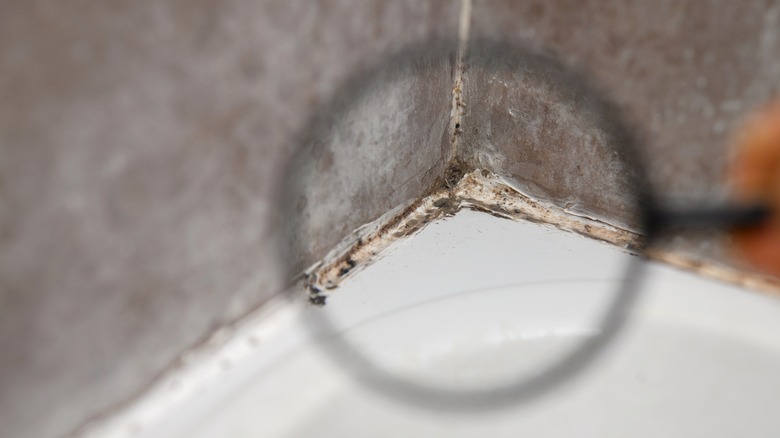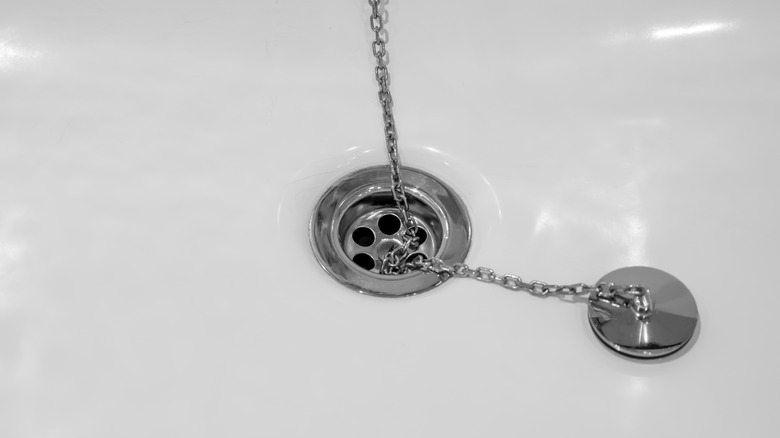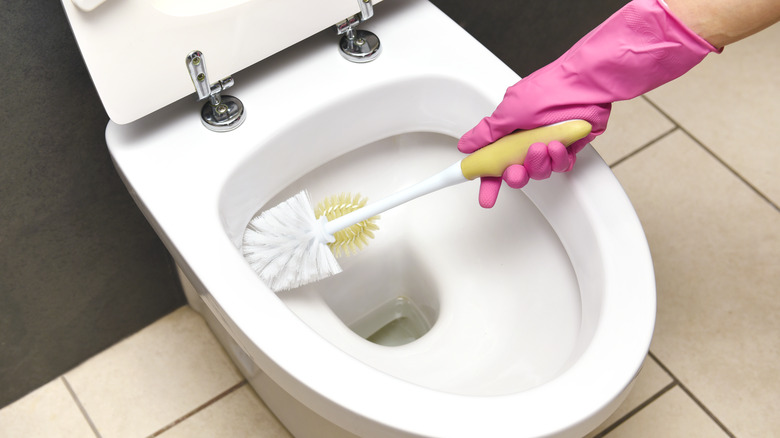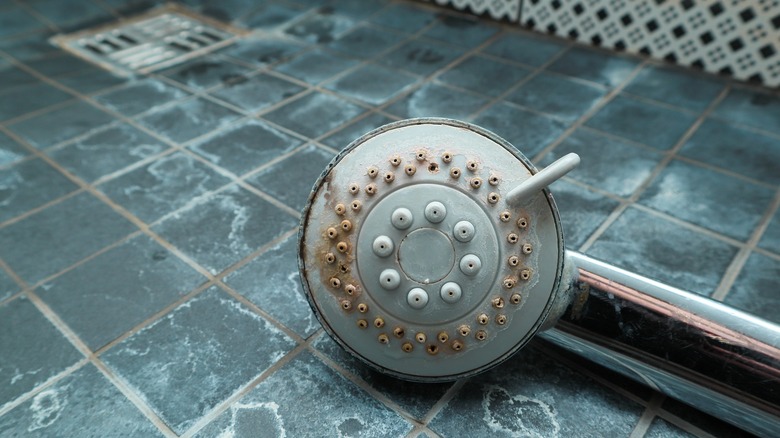Areas In Your Bathroom You Should Be Cleaning With Lemon
It's not surprising that we associate the smell of lemons with cleanliness and freshness. For centuries, people have employed the citric acid in lemons to dissolve dirt, grime, and limescale from multiple surfaces in their homes. Results of a 2009 study in the Journal of Endourology indicate that lemon juice contains 1.44 grams of citric acid per ounce. This amount represents approximately 5-6% of the lemon's juice. Among its many household uses, lemon juice boasts antibacterial properties that make it useful for sanitizing and deodorizing multiple surfaces. Additionally, the acid in lemon juice breaks down the dissolved minerals in hard water to act as a stain remover and de-scaler.
If you want to enjoy a fresh and clean bathroom, look no further than this little citrus fruit. You can use it to clean mirrors, remove stains from the toilet, unclog your drains, and more. Ahead, you'll find suggestions for eight areas of your bathroom where you might put lemons and lemon juice to work as a natural, non-toxic, and planet-friendly cleaning agent.
Clean bathroom mirrors, windows, and glass shower doors with lemon
With its mildly acidic composition, lemon juice will leave your glass shower dazzlingly clean. It's well-suited for dissolving dirt on nonporous surfaces, but the citric acid content is not so strong that it could etch the glass. Put it to work removing smudges, fingerprints, and soap residue on mirrors, windows, soap dishes, and the glass walls and doors of your shower. The citric acid removes stains by adding a charge to the molecules. Those molecules then attach to water molecules, loosening the stain and making them easier to wash away. Due to its natural properties, the U.S. Environmental Protection Agency (EPA) recommends lemon juice as a natural glass cleaner for people who want to limit their household hazardous waste. Rest assured that cleaning with lemon juice is not harmful to your family or the environment.
According to the University of Florida, you can make a homemade glass cleaner by mixing 1 tablespoon of lemon juice with 1 quart of water. For a stronger recipe, you might mix 1 tablespoon of white vinegar with 2 tablespoons of lemon juice in 1 cup of warm water. Mix your cleaning solution in a spray bottle and shake it well. Spray the DIY cleaner on any glass surface and wipe it dry with a microfiber cloth.
Remove rust stains from tubs and sinks
You might see brownish-orange stains accumulating on the white porcelain surfaces of your bathroom sink, shower, or tub. They're caused by iron in the water reacting with moisture and oxygen to produce rust. The source of the rust may be from the iron content in hard water, rusty iron pipes, or a rusty water heater. To avoid using harsh chemicals, you can employ the mildly acidic nature of lemon juice to remove the rust stains. Although the citric acid in lemons is a known rust remover, lemon juice is a common kitchen ingredient that's mild enough to be used safely around children and pets. The acid reacts with the iron oxide in rust and effectively dissolves it. However, you do need another component to remove rust: salt.
You can apply either freshly squeezed juice or the bottled type of lemon juice to tackle those rust stains in your bathroom tub and sink. Your first step will be to make a thick paste from equal parts of lemon juice and salt, whose mildly abrasive properties help scrub rust away. There's no need to measure the two ingredients. Simply mix up a concoction that can cover the rust stains and cling to the porcelain surface without running off. Let the mixture sit on the rust stains for approximately 30 minutes. Then, scrub it off with a sponge, rinse, and dry the area.
Remove soap scum and hard water stains from bathroom surfaces
When soap residue mixes with the minerals in hard water, it leaves behind a scaly coating on bathroom walls, faucets, tubs, and sinks. This soap scum can build up over time until it becomes a major cleaning issue. Due to its alkalinity, soap scum needs an acidic cleaner to dissolve the bonds that bind it to bathroom surfaces. That's where lemon comes in as a safe and natural alternative to commercial cleaners. Its citric acid content is mild, yet it effectively removes soap scum.
When it's time to zap that yucky soap scum, you can spray straight lemon juice directly onto the area. Then, let it sit for a few minutes before wiping away the soap scum with a damp microfiber cloth. Or, create a DIY scrubbing paste by mixing lemon juice, vinegar, and baking soda. After scrubbing the area with the paste, rinse and wipe it dry. While lemon juice is a winner in the fight against soap scum on porcelain and ceramic tiles as well as chrome fixtures, it should never be applied to natural stone surfaces. These include countertops and flooring made from granite, quartz, limestone, slate, travertine, and other natural stone materials, as the citric acid can damage them.
Lemon makes your chrome faucets and handles sparkle
The chrome faucets and handles on sinks, showers, and tubs are like the fine jewelry in a priceless bathroom design. They act as bright, shiny accessories to the room's decor when they're sparkling clean. On the other hand, these fixtures are susceptible to fingerprints, smudges, soap scum, and hard water limescale that detract from their beauty. Fortunately, chrome is a hard, nonporous material that is impervious to damage from the citric acid in lemon juice. For this reason, lemon is a handy cleaning agent to remove the unsightly mess without damaging the surface below. Lemon's acidic makeup is chelating and bonds with minerals in hard water, making them soluble and easier to wash away.
Cleaning faucets and handles with lemon couldn't be simpler. Cut a lemon in half and use the fleshy part as you would use a sponge or scrubber. Rub the fruit directly on the chrome. Allow the lemon juice to sit on the metal for 3-5 minutes. Then, rinse the area with warm water and wipe with a microfiber cloth. Your chrome fixtures will sparkle.
Use lemon to zap mold and mildew growing in the moist areas of your bathroom
With baths, showers, and running water, the atmosphere in your bathroom stays moist much of the time. In that damp environment, it's only natural that mold and mildew might thrive. You'll want to take steps to kill those living fungi whenever you detect their presence. Left unchecked, they can grow to create conditions that are both unsightly and unhealthy. As a remedy, the citric acid in lemons breaks down the mold and mildew on bathroom surfaces.
Launch your attack on mold by cleaning the area with detergent and water. Then, apply either the juice of freshly squeezed lemons or bottled lemon juice concentrate. Use the straight, undiluted juice from either source. You can employ a spray bottle or a sponge to saturate the moldy area with lemon juice. Then, scrub with a nylon-bristle brush or a sponge. Finish up by rinsing and drying the area. When you're cleaning mold, it's a good idea to wear protective gear. The U.S. Environmental Protection Agency (EPA) recommends rubber gloves, eye goggles, and a mask to protect you from the health risks associated with mold and its airborne spores.
Unclog, clean, and deodorize the drains in bathroom sinks and tubs
Due to their citric acid content, lemons boast antibacterial, disinfecting, and deodorizing properties. Additionally, the lingering smell of lemon can be a pleasant benefit of using the citrus fruit juice to clean your bathroom. The acid in lemon juice cuts through substances that may clog drains while it lends a fresh scent to the area.
The professionals at Bill's Plumbing and Sewer, Inc. recommend lemon juice as the active ingredient to open up a clogged drain. Pour 1 cup of straight lemon juice down the drain and allow it to sit for 1 hour. Then, run the hot water for a few minutes to rinse the lemon juice and clear the clog from the drain. As an alternative, the plumbers at Quality First Service Group suggest a four-step approach to clearing a clogged drain. First, pour boiling water down the drain. Then, pour in 8 ounces of baking soda followed by 8 ounces of lemon juice. The combination of the citric acid in lemon juice along with the sodium bicarbonate will break down the clog. Finally, pour boiling water down the drain, again, to clean out any residual matter.
Clean and freshen your toilet with lemons
On cleaning day, lemons are a fresh-smelling alternative to commercial products as well as natural cleaners like vinegar. The citric acid in lemon juice will break down the alkaline mineral deposits that create stains on the porcelain surface of your toilet bowl. It's useful for an occasional clean-out of the toilet tank, as well. When compared with commercial toilet bowl cleaners, lemon juice rates high on the list of safe, non-toxic, and environmentally friendly cleaning agents.
In place of chemical-laden products, you can squeeze the juice of half a lemon directly into your toilet bowl. Add a sprinkle of a mildly abrasive powder like salt or baking soda. Alternatively, you can pour in ¾ cup of borax. Let it sit for about an hour. Then, scrub with a toilet brush and flush. If you see hard water stains in your toilet bowl, try the process recommended by the pros at The Pink Plumber. First, take out some of the water to lower the level. Then, pour full-strength lemon juice on the stains. Let it sit overnight or for several hours. Then, scrub with a toilet brush and flush. As a preventative measure, you can add lemon juice to your toilet tank to stave off future staining.
Lemon juice can descale your shower head and make it shine
You may have noticed a scaly crust that collects on your shower head. It's called limescale, and it's particularly prevalent in homes with hard water containing a high level of minerals, primarily calcium and magnesium. If you allow limescale to build up, it not only looks unattractive, but it also blocks the water flow from the shower nozzles. With the power of citric acid, lemon juice causes a chemical reaction that turns calcium carbonate into a soluble salt that can be easily washed away.
If you want to clean your shower head without removing it, mix up a solution of lemon juice and salt. Soak a microfiber cloth with the solution and use it to wipe the surface of the shower head. Alternatively, you might employ the plastic bag method to descale an attached shower head. First, cut a lemon in half and rub the exposed pulp directly onto the shower head. Then, fill a plastic bag halfway with lemon juice and attach it to the shower head with a rubber band or string so that the head is submerged in the juice. Let it sit for several hours before removing the bag of lemon juice. Or, you can remove the shower head and submerge it in a mixture of lemon juice, baking soda, and water. Allow the head to sit in the solution for 20 minutes before you rinse it thoroughly.
